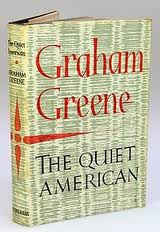
This is the story of a British journalist, sent to Vietnam in the 1950s to cover the violence there, who slowly comes to regard Vietnam as his home.
There are sections which are truly lovely, and make it obvious why this is regarded by many as a classic of the twentieth century. Here is the journalist on his time in Vietnam:
When I first came I counted the days of my assignment, like a schoolboy marking off the days of term; I thought I was tied to what was left of a Bloomsbury square and the 73 bus passing the portico of Euston and springtime in the local in Torrington Place. Now the bulbs would be out in the square garden, and I didn’t care a damn.
As someone who lived in London for many years, and indeed on the route of the 73, I’m oddly touched by his mourning for that city.
Here also is a lovely vision of the life he left back in London (his marriage collapsed just before he moved) through the lens of his night editor:
The editor would joke to the night-editor, who would take the envious thought back to his semi-detached villa in Streatham and climb into bed with it beside the faithful wife he had carried with him years back from Glasgow. I could see so well the kind of house that has no mercy – a broken tricycle stood in the hall and somebody had broken his favourite pipe; and there was a child’s shirt in the living-room waiting for a button to be sewn on.
The kind of house that has no mercy!
The plot of the novel revolves around this journalist having his Vietnamese girlfriend stolen by an idealistic American, who is involved in some decidedly idealistic espionage. It is around questions of plot that this novel gets a little dodgy. First, the Vietnamese girlfriend is a really horrible stereotype, so it makes it hard to care who gets her. I know I am terribly sophisticated and supposed to be able to look past the general misogyny to the author underneath, but this ‘childlike’ ‘silent’ ‘unfeeling’ girlfriend just defeated me.
We are also on less sure ground when it comes to his attempts to describe the war in Vietnam. At one point he comes across two dead civilians – mother and son. Now, I’d defy any narrator to comment on this in a way that could make one laugh, but how dire is this:
He was wearing a holy medal round his neck, and I said to myself, “The juju doesn’t work.” There was a gnawed piece of loaf under his body. I thought, “I hate war.”
Oh dear! We were definitely on safer ground with London.
